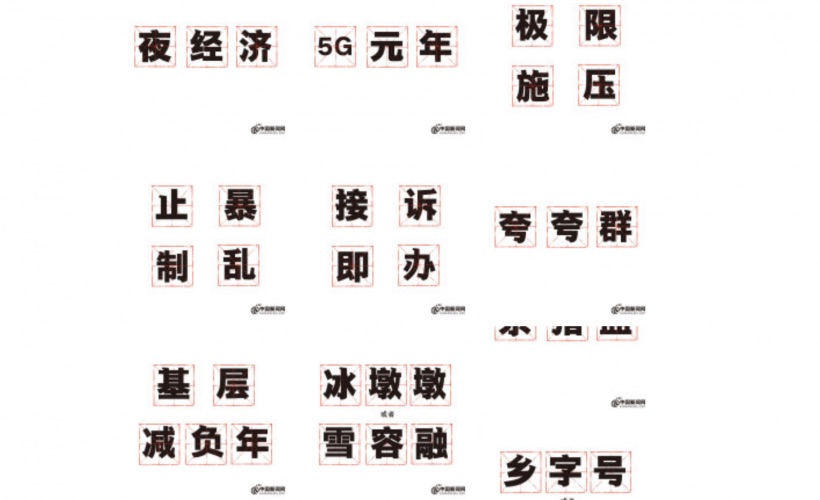Chinese internet does not like official list of 2019 top buzzwords
Chinese internet does not like official list of 2019 top buzzwords

It’s that time again: time to figure out what popular words or phrases dominated public discourse in China over the course of 2019. To provide an official narrative about a series of “key events in the country’s economic and social developments,” a government-backed institution recently released a list of the top 10 buzzwords in China media in 2019. It was slammed by Chinese internet users for its lack of diversity and relatability.
Published on December 16, the list was put together by Chinese National Language Monitoring and Research Center (国家语言资源监测与研究中心 guójiā yǔyán zīyuán jiāncè yǔ yánjiū zhōngxīn), a joint institution backed by China’s education ministry and Beijing Language and Culture University. The top buzzwords are:
1. “Night economy” (夜经济 yèjīngjì): In an effort to boost its slowing economy, which discouraged people from consumption and caused national retail sales growth to fall to a 16-year low in May, China has been aggressively investing in the concept of “night economy.” The nationwide initiative requires local businesses to extend their operating hours and provide more nighttime events in order to attract customers. While many Chinese cities and provinces have rolled out a string of policies in response to the order, the efforts don’t seem to have had a desirable effect, as Chinese young professionals reportedly prefer to stay in than go out.
2. “The first year of the 5G era” (5G元年 yuánnián): In November, China launched the world’s largest 5G network, making 5G commercial services available in 50 cities across the country. 2019 marked a breakthrough for China’s quest to dominate the technology, and it shows “a new energy in motion in China’s economic growth,” according to the research center.
3. “Extreme pressure” (极限施压 jíxiànshīyā): This is a phrase commonly used by Chinese officials in describing the U.S.’s general policy toward China during the trade disputes. In an article published by Xinhua News Agency in May, the author — commenting on a new wave of U.S. tariffs imposed on Chinese goods — wrote (in Chinese): “The U.S. should realize that making preposterous demands and putting extreme pressure on us will lead both sides to a dead end.”
4. “Stop the violence and end the chaos” (止暴制乱 zhǐbàozhìluàn): When attending the 11th BRICS summit in Brasilia, Brazil, Xi Jinping proclaimed (in Chinese) that the most urgent task for the Chinese government in handling the Hong Kong protests was to “stop the violence and end the chaos.” Since then, the phrase has been quoted by Chinese media as the authorities’ main approach to dealing with the Hong Kong situation.
5. “Reacting promptly after receiving complaints” (接诉即办 jiēsùjíbàn): Chinese officials, especially those on the local level, are notoriously known for investigating complaints with significant delays or not responding to them at all. In an attempt to improve the situation, the Chinese government launched an initiative this year, encouraging officials on various levels to “react promptly after receiving complaints.”
6. “Praise-lavishing chat groups” (夸夸群 kuākuāqún): This is a fad that involves a number of people, sometimes strangers, giving flattering comments about each other in a group chat. As Sixth Tone noted, this phenomenon became extremely popular among young Chinese because they were in need of psychological support while mired in “feelings of depression and ennui.”
7. “The year of alleviating burdens on primary-level government officials” (基层减负年 jīcéngjiǎnfùnián): In March, the General Office of the CPC Central Committee issued a statement that stressed its objectives of curbing “the practice of ‘formalities for formalities’ sake” and “alleviating burdens on primary-level authorities.” In reality, the efforts translated to making local-level officials less stressed about pleasing higher authorities and more focused on serving the people.
8. “Bing Dwen Dwen” and “Shuey Rhon Rhon” (冰墩墩/雪容融 bīngdūndūn / xuěróngróng): These are two mascots for the 2022 Beijing Winter Olympic and Paralympic Games, a.k.a. “spaced-out pandas,” in The China Project editor-in-chief Jeremy Goldkorn’s words.
9. “The game of killing pigs” (杀猪盘 shāzhūpán): This is a colloquialism used by a certain type of scammer who play long games with their victims to maximize their gains. In 2019, this phrase received a lot of visibility due to the extensive coverage of pick-up artists in Chinese media. These romance swindlers take time to prey on vulnerable people before scamming them out of money.
10. “Local brands” (乡字号/土字号 xiāngzìhào / tǔzìhào): In a document that offers guidelines on boosting economic growth in Chinese rural areas, the State Council promised that local brands would receive a series of incentives to market and sell their agricultural products outside of their hometowns.
Per China News Service (in Chinese), to determine the list, the research center used a combination of tools, which include both computer technologies and linguistic experts, to analyze more than 650,000 articles from nine major newspapers, 20 radio and television stations, and four online news portals.
Shortly after the list was announced, the disappointed and critical comments quickly started rolling in. Some brought up the point that the buzzwords are, in fact, not popular. “I’m clearly out of touch. I don’t see or use these words often in real life,” one internet user wrote. Others criticized the list for being unrealistically positive, which is not a true reflection of how people see their life. For example, some people argued that “consumption downgrade” (消费降级 xiāofèijiàngjí), a popular word among people in China’s middle class this year, deserved a spot on the list. When someone on Weibo raised questions about the omission, another Weibo user replied (in Chinese), “This one is not positive enough to be included.”






